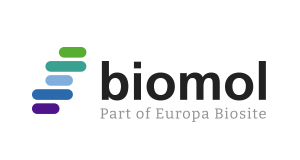Interleukin-1 receptor-like 1, His Tag, human recombinant (rHuIL1RL1-His)
Interleukin-1 receptor-like 1, His Tag, human recombinant (rHuIL1RL1-His)
Artikelnummer
BOL97285.10
Verpackungseinheit
10 µg
Hersteller
Biomol
Verfügbarkeit:
wird geladen...
Preis wird geladen...
Kategorie: Cytokines
Formulation: purified
Storage: -20°C
Purity: >95%
Description: Receptor for interleukin-33 (IL-33), its stimulation recruits MYD88, IRAK1, IRAK4, and TRAF6, followed by phosphorylation of MAPK3/ERK1 and/or MAPK1/ERK2, MAPK14, and MAPK8. Possibly involved in helper T-cell function. (www.uniprot.org) Human recombinant IL1RL1 produced in E.coli is a single, non-glycosylated, polypeptide chain containing 310 amino acids fragment (19-328) corresponding to the soluble IL1RL1 coding sequence, having a molecular weight of 36kDa and fused with a 4.5kDa amino-terminal hexahistidine tag. The IL1RL1 gene is a member of the IL-1 receptor family, encoding a transmembrane protein with a structure similar to IL-1R1. IL1RL1 is a receptor for interleukin-33, its stimulation recruits MYD88, IRAK1, IRAK4, and TRAF6, followed by phosphorylation of MAPK3/ERK1 and/or MAPK1/ERK2, MAPK14, and MAPK8. IL1RL1 may possibly be involved in helper T-cell function. IL1RL1 is highly expressed in kidney, lung, placenta, stomach, skeletal muscle, colon and small intestine. A soluble form of the IL1RL1 is produced from the same gene by alternative splicing and was shown to be expressed in several cell types including fibroblasts and mast cells. Soluble IL1RL1 also acts as a negative regulator of Th2 cytokine production and high levels have been reported in several disease states and conditions including asthma, sepsis and myocardial infarction. Analysis of the similar gene in mouse suggested that the IL1RL1 receptor can be induced by proinflammatory stimuli, and may be involved in the function of helper T-cells.
Formulation: purified
Storage: -20°C
Purity: >95%
Description: Receptor for interleukin-33 (IL-33), its stimulation recruits MYD88, IRAK1, IRAK4, and TRAF6, followed by phosphorylation of MAPK3/ERK1 and/or MAPK1/ERK2, MAPK14, and MAPK8. Possibly involved in helper T-cell function. (www.uniprot.org) Human recombinant IL1RL1 produced in E.coli is a single, non-glycosylated, polypeptide chain containing 310 amino acids fragment (19-328) corresponding to the soluble IL1RL1 coding sequence, having a molecular weight of 36kDa and fused with a 4.5kDa amino-terminal hexahistidine tag. The IL1RL1 gene is a member of the IL-1 receptor family, encoding a transmembrane protein with a structure similar to IL-1R1. IL1RL1 is a receptor for interleukin-33, its stimulation recruits MYD88, IRAK1, IRAK4, and TRAF6, followed by phosphorylation of MAPK3/ERK1 and/or MAPK1/ERK2, MAPK14, and MAPK8. IL1RL1 may possibly be involved in helper T-cell function. IL1RL1 is highly expressed in kidney, lung, placenta, stomach, skeletal muscle, colon and small intestine. A soluble form of the IL1RL1 is produced from the same gene by alternative splicing and was shown to be expressed in several cell types including fibroblasts and mast cells. Soluble IL1RL1 also acts as a negative regulator of Th2 cytokine production and high levels have been reported in several disease states and conditions including asthma, sepsis and myocardial infarction. Analysis of the similar gene in mouse suggested that the IL1RL1 receptor can be induced by proinflammatory stimuli, and may be involved in the function of helper T-cells.
| Artikelnummer | BOL97285.10 |
|---|---|
| Hersteller | Biomol |
| Hersteller Artikelnummer | 97285.10 |
| Verpackungseinheit | 10 µg |
| Mengeneinheit | STK |
| Reaktivität | Human |
| Wirt | Escherichia Coli |
| Produktinformation (PDF) | Download |
| MSDS (PDF) |
|

 English
English






